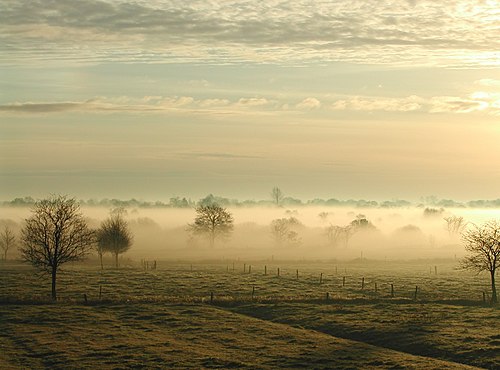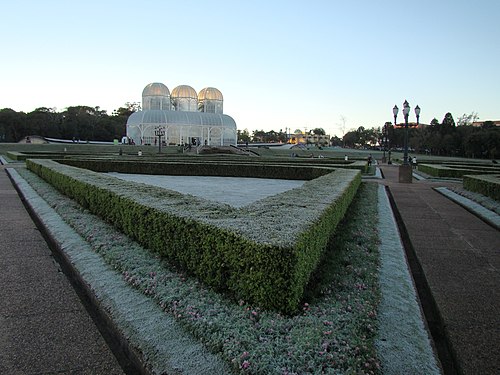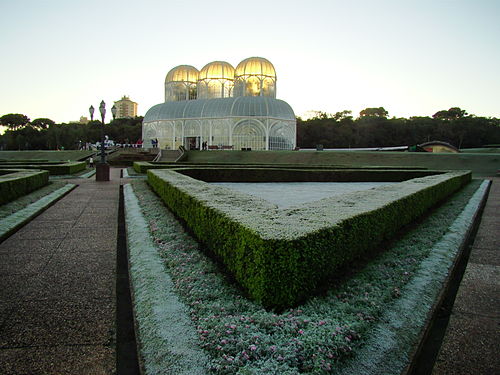Fognoun
(uncountable) A thick cloud that forms near the ground; the obscurity of such a cloud.
Fognoun
(uncountable) A mist or film clouding a surface.
Fognoun
A state of mind characterized by lethargy and confusion.
Fognoun
(photography) A silver deposit or other blur on a negative or developed photographic image.
Fognoun
(computer graphics) Distance fog.
Fognoun
A new growth of grass appearing on a field that has been mowed or grazed.
Fognoun
Tall and decaying grass left standing after the cutting or grazing season; foggage.
Fognoun
(Scotland) Moss.
Fogverb
(intransitive) To become covered with or as if with fog.
Fogverb
(intransitive) To become obscured in condensation or water.
Fogverb
To become dim or obscure.
Fogverb
(transitive) To cover with or as if with fog.
Fogverb
(transitive) To disperse insecticide into (a forest canopy) so as to collect organisms.
Fogverb
(transitive) To obscure in condensation or water.
Fogverb
(transitive) To make confusing or obscure.
Fogverb
To make dim or obscure.
Fogverb
To practice in a small or mean way; to pettifog.
Fogverb
(transitive) To pasture cattle on the fog, or aftergrass, of; to eat off the fog from.
Fogverb
(intransitive) To become covered with the kind of grass called fog.
Fognoun
A second growth of grass; aftergrass.
Fognoun
Watery vapor condensed in the lower part of the atmosphere and disturbing its transparency. It differs from cloud only in being near the ground, and from mist in not approaching so nearly to fine rain. See Cloud.
Fognoun
A state of mental confusion.
Fognoun
Cloudiness or partial opacity of those parts of a developed film or a photograph which should be clear.
Fogverb
To pasture cattle on the fog, or aftergrass, of; to eat off the fog from.
Fogverb
To practice in a small or mean way; to pettifog.
Fogverb
To envelop, as with fog; to befog; to overcast; to darken; to obscure.
Fogverb
To render semiopaque or cloudy, as a negative film, by exposure to stray light, too long an exposure to the developer, etc.
Fogverb
To show indistinctly or become indistinct, as the picture on a negative sometimes does in the process of development.
Fognoun
droplets of water vapor suspended in the air near the ground
Fognoun
an atmosphere in which visibility is reduced because of a cloud of some substance
Fognoun
confusion characterized by lack of clarity
Fogverb
make less visible or unclear;
Fognoun
a thick cloud of tiny water droplets suspended in the atmosphere at or near the earth's surface which obscures or restricts visibility (to a greater extent than mist; strictly, reducing visibility to below 1 km)
Fognoun
an opaque mass of particles in the air
Fognoun
cloudiness which obscures the image on a developed negative or print.
Fognoun
a state or cause of perplexity or confusion
Fognoun
the grass which grows in a field after a crop of hay has been taken.
Fognoun
long grass left standing in a pasture and used as winter grazing.
Fogverb
(with reference to a glass surface) cover or become covered with steam
Fogverb
make (a film, negative, or print) obscure or cloudy.
Fogverb
bewilder or puzzle
Fogverb
make (an idea or situation) difficult to understand
Fogverb
spray with an insecticide.
Fog
Fog is a visible aerosol consisting of tiny water droplets or ice crystals suspended in the air at or near the Earth's surface. Fog can be considered a type of low-lying cloud usually resembling stratus, and is heavily influenced by nearby bodies of water, topography, and wind conditions.
Frostnoun
A cover of minute ice crystals on objects that are exposed to the air. Frost is formed by the same process as dew, except that the temperature of the frosted object is below freezing.
Frostnoun
The cold weather that causes these ice crystals to form.
Frostnoun
(figurative) Coldness or insensibility; severity or rigidity of character.
Frostnoun
(obsolete) The act of freezing; the congelation of water or other liquid.
Frostnoun
A shade of white, like that of frost.
Frostnoun
A disappointment; a cheat.
Frostverb
(transitive) To cover with frost.
Frostverb
(intransitive) To become covered with frost.
Frostverb
(transitive) To coat (something, e.g. a cake) with icing to resemble frost.
Frostverb
(transitive) To anger or annoy.
Frostverb
(transitive) To sharpen (the points of a horse's shoe) to prevent it from slipping on ice.
Frostnoun
The act of freezing; - applied chiefly to the congelation of water; congelation of fluids.
Frostnoun
The state or temperature of the air which occasions congelation, or the freezing of water; severe cold or freezing weather.
Frostnoun
Frozen dew; - called also hoarfrost or white frost.
Frostnoun
Coldness or insensibility; severity or rigidity of character.
Frostverb
To injure by frost; to freeze, as plants.
Frostverb
To cover with hoarfrost; to produce a surface resembling frost upon, as upon cake, metals, or glass; as, glass may be frosted by exposure to hydrofluoric acid.
Frostverb
To roughen or sharpen, as the nail heads or calks of horseshoes, so as to fit them for frosty weather.
Frostnoun
ice crystals forming a white deposit (especially on objects outside)
Frostnoun
weather cold enough to cause freezing
Frostnoun
the formation of frost or ice on a surface
Frostnoun
United States poet famous for his lyrical poems on country life in New England (1874-1963)
Frostverb
decorate with frosting;
Frostverb
provide with a rough or speckled surface or appearance;
Frostverb
cover with frost;
Frostverb
damage by frost;
Frostnoun
a deposit of small white ice crystals formed on the ground or other surfaces when the temperature falls below freezing
Frostnoun
a weather condition or period of cold weather in which deposits of frost form
Frostnoun
a person's cold or unfriendly manner
Frostnoun
a failure
Frostverb
cover (something) with or as if with frost; freeze
Frostverb
become covered with small ice crystals
Frostverb
damage or otherwise affect as a result of frost.
Frostverb
decorate (a cake or biscuit) with icing
Frost
Frost is a thin layer of ice on a solid surface, which forms from water vapor in an above-freezing atmosphere coming in contact with a solid surface whose temperature is below freezing, and resulting in a phase change from water vapor (a gas) to ice (a solid) as the water vapor reaches the freezing point. In temperate climates, it most commonly appears on surfaces near the ground as fragile white crystals; in cold climates, it occurs in a greater variety of forms.




















































